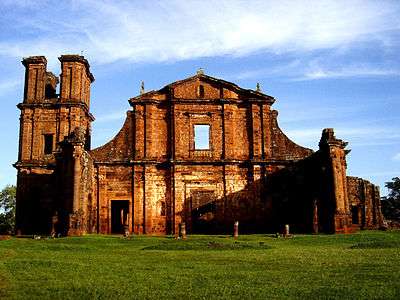Olinda
Olinda (Portuguese pronunciation: [oˈlĩdɐ]) is a historic city in the Brazilian state of Pernambuco, located on the country's northeastern Atlantic Ocean coast, in Greater Recife (capital of Pernambuco State).[1] It has a population of 389,494 people, covers 41.681 square kilometres (16.093 sq mi), and has a population of 9 inhabitants per square kilometer. It is noted as one of the best-preserved colonial cities in Brazil.[2]
Olinda | |
|---|---|
Municipality | |
| The Municipality of Olinda | |
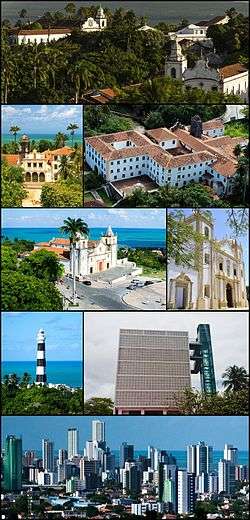 Top: Church of Our Lady of Grace Seminary (Igreja de Nossa Senhora da Graça Foi), 2nd left: Church of Our Lady of the Snows (Igreja de Nossa Senhora das Neves
Seminário de Olinda) in Convent of San Francisco (Convento de São Francisco), 2nd right: Church and Monastery of St. Benedict, 3rd left: Panoramic view of the Alto da Sé, from the Panoramic lift of Olinda, 3rd right: Church of Carme, 4th left: Olinda Lighthouse, 4th right: Panoramic lift of Olinda, Bottom View of Atlantic Ocean and downtown area | |
 Flag  Seal | |
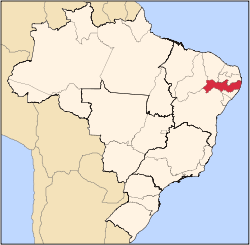 | |
 Olinda Location in Brazil | |
| Coordinates: 8°0′32″S 34°51′18″W | |
| Country | |
| Region | Northeast |
| State | |
| Founded | March 12, 1535 |
| Incorporated (as village) | 1537 |
| Incorporated (as city) | 1676 |
| Government | |
| • Mayor | Lupércio Carlos do Nascimento |
| Area | |
| • Municipality | 43.55 km2 (27.1 sq mi) |
| • Metro | 2,768 km2 (1,068.7 ;) sq mi) |
| Elevation | 16 m (52 ft) |
| Population (2015) | |
| • Municipality | 389,494 |
| • Density | 5.660/km2 (14.659/sq mi) |
| • Metro | 3,768,902 |
| Time zone | UTC-3 (UTC-3) |
| Website | Olinda, Pernambuco |
Olinda features a number of major tourist attractions, such as a historic downtown area (World Heritage Site), churches, and the Carnival of Olinda, a popular street party, very similar to traditional Portuguese carnivals, with the addition of African influenced dances. Unlike in Rio de Janeiro and Salvador, in Olinda, admission to Carnival is free. All the festivities are celebrated on the streets, and there are no bleachers or roping. There are hundreds of small musical groups (sometimes featuring a single performer) in many genres.
History
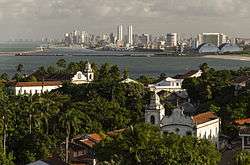
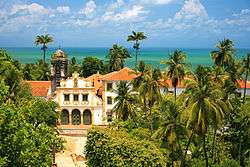
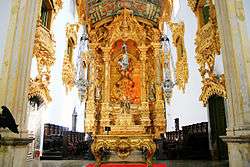
| UNESCO World Heritage Site | |
|---|---|
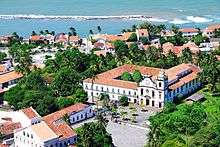 View of Olinda | |
| Criteria | Cultural: ii, iv |
| Reference | 189 |
| Inscription | 1982 (6th session) |
| Area | 120 ha |
| Buffer zone | 920 ha |
Several indigenous tribes occupied the coast of Northeastern Brazil for several thousand years, and the hills of the present day municipality of Olinda had settlements of Caetés and Tupinambá tribes, which were frequently at war. French mercenaries are thought to be the first Europeans to get to the region, but the Portuguese exploited intertribal rivalries and managed to build a stronghold on the former Caeté village in the higher hill. Recent studies by the Universidade Federal de Pernambuco [Federal University of Pernambuco] have uncovered new evidence of the pre-colonial population of the area. The settlement of Olinda was founded in 1535 by Duarte Coelho Pereira; it was elevated to a town on March 12, 1537.[1] It was made the seat of the Territorial Prelature of Pernambuco in 1614, becoming the Diocese of Olinda in 1676. The economy of the region was dominated by the production of sugarcane. The importation of slaves from Africa to support the economy made Olinda a colonial stronghold. By 1600 its economy was based on sugar, and imported African slave labor had made it a colonial stronghold. Slavery existed in Olinda until the Lei Áurea, or Golden Law, abolished slavery in Brazil in 1888.
Olinda was the capital of the hereditary captaincy of Pernambuco, but was burned by Dutch invaders. The Portuguese built their town on the hill, for practical purposes (sewers) and to make it easier to defend. In the 17th century the Kingdom of Portugal was united with Spain (the 1580-1640 Iberian Union period). Taking advantage of this period of Portuguese weakness, the area around Olinda and Recife was occupied by the Dutch who gained access to the Portuguese sugarcane plantations.[2] John Maurice, Prince of Nassau-Siegen was appointed as the governor of the Dutch possessions in Brazil in 1637 by the Dutch West India Company on recommendation of Frederick Henry. He landed at Recife, the port of Pernambuco and the chief stronghold of the Dutch, in January 1637. By a series of successful expeditions, he gradually extended the Dutch possessions from Sergipe on the south to São Luís de Maranhão in the north. He likewise conquered the Portuguese possessions of Saint George del Mina, Saint Thomas, and Luanda, Angola, on the west coast of Africa. After the dissolution of the Iberian Union in 1640, Portugal would reestablish its authority over the lost territories of the Portuguese Empire.
Olinda declined in importance after the Dutch invasion. Recife became the capital of Pernambuco in 1827. The city now serves as a suburb to the greater Recife metropolitan area. Due to the historic position of the city, its cathedral, a World Heritage Site, São Salvador do Mundo, remains the primary seat of the Roman Catholic Archdiocese of Olinda e Recife,[1] with a co-cathedral in Recife, while Olinda also has a Minor Basilica, again World Heritage Site (Minor): Basílica Abacial do Mosteiro de São Bento de Olinda.[3]
Besides its natural beauty, Olinda is also one of Brazil's main cultural centers. Declared in 1982 a Historical and Cultural Patrimony of Humanity by the UNESCO, Olinda relives the magnificence of the past every year during the Rio-style Carnival, on the rhythms of frevo, maracatu and others rhythms.
Economy
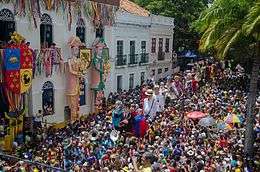
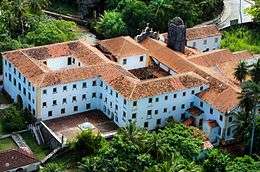
The main economic activities in Olinda are based in tourism, commerce, transportation industry and artcraft. The tourist sector has a boom every Carnival when thousands of people are in the old historic town center.
Gallery
Historic Centre
 One of the roads of the historic centre
One of the roads of the historic centre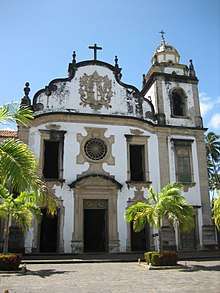 A church in the historic center
A church in the historic center Distant view of historic center with sea behind
Distant view of historic center with sea behind
See also
References
- "Olinda". Encyclopædia Britannica. Chicago, Ill.: Encyclopædia Britannica, Inc.
- "Pernambuco, Olinda" (in Portuguese). Instituto Brasileiro de Geografia e Estatística. 2016. Retrieved 2016-08-12.
- http://www.gcatholic.org/dioceses/diocese/olin0.htm
- Olinda 2007 GDP IBGE page 31 Archived 2016-03-04 at the Wayback Machine
External links
| Wikimedia Commons has media related to Olinda. |
![]()
- Official website
- https://web.archive.org/web/20130407002251/http://olindavirtual.org/
- https://web.archive.org/web/20060614045202/http://www.olinda.com.br/ Commercial site
- Video Olinda, Pernambuco (PT)
- Video Olinda street Carnival

